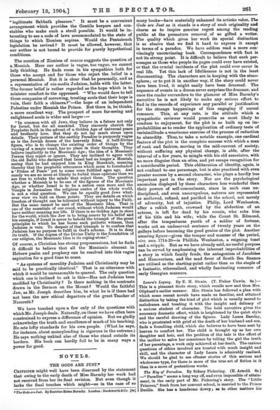Cnimrsm might well have been disarmed by the statement that
owing to the early death of Miss Barmby her work had not received from her its final revision. But even though it lacks the final touches which might—as in the case of so
• The Gods are Just. By Beatrice Helen Barmby. London: Duckworth & Co. [6a1
many books—have materially enhanced its artistic value, 27s* Gods are Just as it stands is a story of such originality and charm as to inspire genuine regret among the reading public at the premature removal, of so gifted a writer. The quality which gives her work its special distinction is so elusive that we find it hard to express it except in terms of a paradox. We have seldom read a more con- vincingly unconvincing book. Correspondence with fact is not its strong point. It is difficult to believe that such per- sonages as those who people its pages could ever have existed, or that the crucial incidents of the plot could ever occur in real life. Yet this lack of lifelikeness is not in the least disconcerting. The characters are in keeping with the atmo- sphere; or to put it in another way, if the story could never have been lived, it might easily have been dreamed. The sequence of events in a dream never surprises the dreamer, and once the reader surrenders to the glamour of Miss Barmby's narrative he is not likely to make any serious effort to find in the records of experience any parallel or justification for the strange happenings of this engaging if unreal romance. This, at any rate, is the attitude which a sympathetic reviewer would prescribe as most likely to conduce to enjoyment, for the plot is so built up on im- probabilities as to render the application of ordinary tests of verisimilitude a wearisome exercise of the process of reduction to absurdity. Thus, to take a notable example, one cardinal feature of the plot is the complete success with which a man of rank and fashion, moving in the mid-current of society, without suffering any physical change, is able, after the interval of a few years, to mingle with his old associates, with no more disguise than an alias, and yet escape recognition for a considerable period. This obliteration of identity, again, is not confined to one personage, but is also practised with even greater success by a second character, who plays a hardly less important part in the story. Nor are the psychological anomalies displayed by these characters less wonderful than their powers of self-concealment, since in each case un- disciplined, and even unscrupulous, natures are represented as mellowed, refined, and purified in the school, not merely of adversity, but of injustice. Philip, Lord Wenhaston, after a rakish youth, crowned by the abduction of an actress, is left for dead by his cousin, who robs him of his title and his wife; while the Count St. Edmond, after the tempestuous youth of a soldier of fortune, works out an undeserved sentence of twenty years on the galleys before becoming the good genius of the plot. Another amazing figure—given the temper and manner of the period, circ. ann. 1714-20—is Phillida Wenhaston, a reigning toast and a cripple. But as we have already said, no useful purpose can be served by emphasising the inherent improbabilities of a story in which family feuds, the antagonism of Jacobites and Hanoverians, and the mad fever of South Sea finance are utilised as the starting-point rather than as the staple of a fantastic, etherealised, and wholly fascinating romance of early Georgian manners.






































 Previous page
Previous page